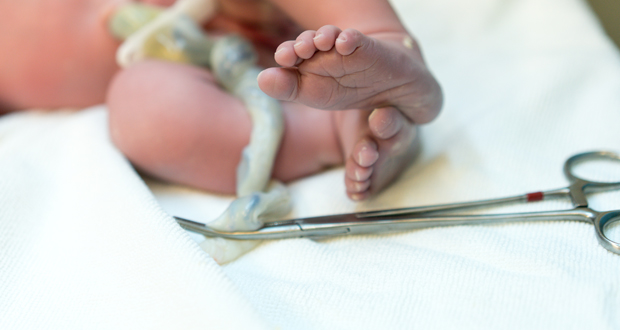Delaying cord clamping will save thousands of preterm babies

Waiting one minute before clamping the umbilical cords of preterm babies could save lives, according to new research.
Approved for publishing in the American Journal of Obstetrics and Gynecology, the systematic review assessed morbidity and mortality outcomes from 18 trials comparing delayed versus immediate cord clamping in nearly 3,000 babies born before 37 weeks’ gestation.
It found clear evidence that delayed clamping reduced hospital mortality by a third and is safe for mothers and pre-term infants.
The review also reported that delayed clamping reduced subsequent blood transfusions and increased neonatal hematocrit, confirming that placental transfusion occurred.
Associate Professor David Osborn, the review’s lead author and a neonatal specialist at Royal Prince Alfred Hospital, said the team estimates that for every thousand very preterm babies born more than 10 weeks early, delayed clamping will save up to 100 additional lives compared with immediate clamping.
“This means that, worldwide, using delayed clamping instead of immediate clamping can be expected to save between 11,000 and 100,000 additional lives every year,” Osborn said.
A previous multicentre randomised controlled trial of more than 1500 preterm infants — looked at in the systematic review and called the Australian Placental Transfusion Study (APTS) — reported that the mortality rate in the delayed clamping group was lower (6.4 per cent) than that in the standard cohort (9 per cent).
Co-author of the APTS, Professor Roger Soll from the University of Vermont, said about 15 million babies are born before 37 weeks' gestation annually and one million die. “This procedure costs nothing and will make a difference to families worldwide.”
Newborn neonatologist and APTS site investigator at Monash Children’s Hospital Professor Arvind Sehgal, from Monash University, said the study stands to benefit infants of all gestations.
“The blood stored in the placenta is the baby’s own blood and transfusion of this warm and auto matched blood from the placenta by delaying cord clamping by 60 seconds has shown to significantly improve outcomes.
“This is a great example of collaborative, physiology-driven clinical research at the international level which ultimately benefits the most vulnerable infants in our care,” Sehgal said.
Professor Euan Wallace, co-author of the APTS and head of Department of Obstetrics and Gynaecology at Monash University, said no fancy new drugs or new bits of equipment are required. “All that is needed is to delay clamping the baby's cord for a minute or so,” Wallace said.
Email: [email protected]




